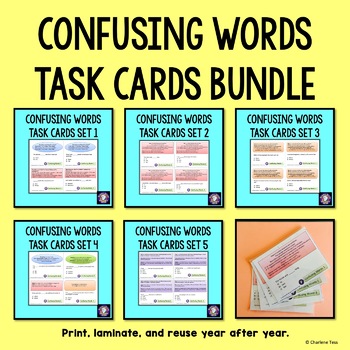Before choosing between the words "eager" and "anxious," decide exactly what you mean to say.
“Eager” means excited, interested, or impatient.
“Anxious” means afraid or nervous about what may happen.
Note the correct words in the sentences below:
Jane felt (eager, anxious) about the math test because she had not studied for it.
The bride and groom were (eager, anxious) to say their vows.
Now you try it:
The puppy was (eager, anxious) to please his master.
The patient was (eager, anxious) to hear the doctor’s report.
These words are often used interchangeably, but they should not be. They are not the same. Take the time to say what you really mean.
Visit my TpT store for more helpful tips and lessons.
Here's a bundle of task cards to help your students master more confusing words. You will find them here.
This post is an update from a previous post.
Thanks for reading,
Inlinkz Link Party












